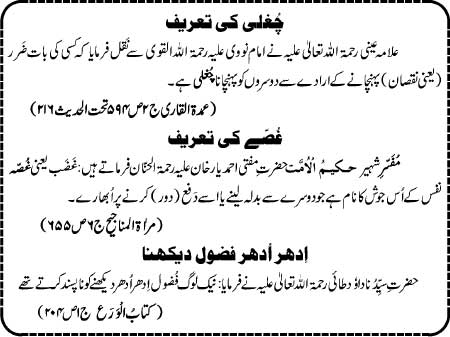
Hazrat Muhammad(PBUH) – The Preceptor Of Love
The Holy Qur’an and the life of Prophet Muhammad (peace be upon him) are explicit ratifications of the latter’s unique and exalted status amongst the entire mankind. Since many people follow no religion or religion other than Islam, an explanation based on scientific discoveries supported by Qur’an and Prophet’s life will be easier, more convincing, and more logical for them.
I have tried, here in this write-up, to uphold Prophet Mohammad’s position as the most revered apostle of Allah, on this planet, through a common, non-religious, and scientific perspective, since non-believers may find it difficult to accept only Qur’anic testimonies willingly.
Science basically deals with matter and its variable characteristics in different circumstances and while in contact with different solids, liquids, and gases.
The results not only enhance man’s knowledge but leave him awestruck at times, but it is a fact that Divine revelation is the re-affirmation of the fact that celestial knowledge is the most appropriate tool for guiding inherently the limited human intellect.
That’s why Allah despite giving senses and brain to man has regularly, at intervals, selected/appointed his messengers, from the very same people, who were taught by divine revelations and given knowledge about the man’s physical relation to soul and that of soul’s relation to the Almighty and warning about the accountability of performance in this world, in terms of good or bad.
Prophet Muhammad was chosen as the last Messenger of Allah; therefore, his teachings based on revelations sent down to him shall stand true and final for all human beings till the day of resurrection.
Mankind is the superb creation of Allah. The whole universe is so diligently designed that it supports the survival and existence of life and its necessaries. A question can be asked: “What would happen if the rotation axis of the earth is changed”? Scientists believe it is impossible but a close encounter with another body of a planet-size can do it and it will create tectonic upheavals. The surface of the earth would become molten. One would possibly survive it and the biosphere+atmosphere would be transfigured. The only survivors would be bacteria.
The Qur’an says: “You will not find any disorder or haphazardness in the creations of Allah, e.g.: you look at the sky and look at it again and again, you will not find any rifts on its surface or at the end. (67:3)
Lightning and thunder during the rainy season is a common thing to note. Sometimes, it is so strong and loud that one shivers at the thought of its possible devastation.
It is later learned that every minute there are 1,000 cyclones of various magnitudes erupting on the earth and every minute 6,000 flashes of lightning take place in the world.
The temperature at the source of originating point of lightning rises to 54,000 F, which is approximately five times more than the temperature of the sun.
And the lightning path is naturally to the ground and it needs the nearest point i.e. the highest structure to reach the ground, but the clouds conditions are so designed by nature that most of the time the lightning dissipates in the clouds only and once in a while out of 6,000 times of daily lightning, it strikes the earth or some structure on the earth. We just think it as normal but it is not. It is the part of the system that is running for the survival of mankind on the earth.
The Qur’an says: “He it is Who has made the earth subservient to you ( i.e. easy for you to walk, to live and to do agriculture on it); so walk in the path thereof and eat of His provision. And to Him will be the Resurrection. And: “Do you feel secure that He, Who is over the heaven (Allah), will not cause the earth to sink with you, and then it should quake?” (67:15-16)
So fine and delicate an adjustment is not a mere coincidence.
Earthquakes, tsunamis, and landslides, and volcanoes are all fine examples for the believers in the powers of Allah’s grip on everything and they do righteous deeds and always ask His forgiveness for mistakes and reward of paradise in return.
The Qur’an says: “Who has made the earth for you like a bed (spread out); and has opened roads (ways and paths) for you therein, and has sent down water (rain) from the sky. And We have brought forth with it various kinds of vegetation. eat and pasture your cattle (therein); verily, in this are Ayat (proofs and signs) for men of understanding. (20-53-54).
At another place, the Qur’an says: “Allah has made the Kaaba, the Sacred House, an asylum for security and benefits (e,g. Haj and Umrah) for mankind…” (5-97)
Further, if we draw a circle with a diameter of 8,039 km, its center will be Makkah, covering old continents with slight margins. If the diameter is made 13,300 km, then Makkah also becomes the center for new continents, covering Australia, North and South America. Thus, the Kaaba, the epicenter of Muslim worship, in Makkah falls exactly in the center point of the arid land of the Earth. (It is an established fact that cannot merely be a coincidence).
Tasveer Sazi
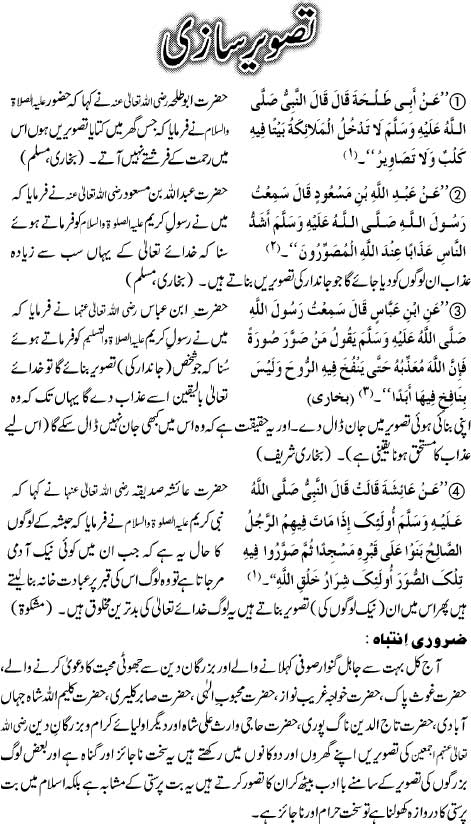
Rights Of Women
The pre-Islamic Arabs attached less importance to the person of a woman than that of a man. Thus, if the culprit was a man and the victim a woman, retaliation could not take place. The Qur’an abolished this inequality, and crimes against the woman were placed on the same level as those against the man, whether they concerned person or property or honor.
One may even say that in certain cases the rights of women are held to be more important. For instance, the Qur’an (24:4-5) decrees that if a man accuses a woman of immorality and does not produce proof, he is exposed not only to the penalty prescribed for a false accusation but to be declared for perpetuity as unworthy of giving an evidence before a tribunal (this in addition to the Divine punishment in the Hereafter, which however may be effaced in case of repentance). There is almost a consensus of opinion that repentance erases sin in the eschatological sense, yet the ineligibility to giving evidence remains constant in spite of the recognized repentance. The Qur’an seems to require the purging of society from the evil of inconsiderate talks, particularly in matters where injury is easy to inflict and difficult to remedy.
The perfect and complete individuality of the person of the woman is manifest in a most striking manner in the matter of property. According to Islamic law, the woman possesses the most absolute right over her property. If she has attained majority, she may dispose it of according to her will without reference to anybody else, whether it be her father, brother, husband or son, or any other person. There is no difference in this matter between a man and a woman. The property of a woman cannot be touched even if her husband or father or any other relative has liabilities exceeding his assets. Similarly, these relatives are not held responsible if she contracts debts. A woman has the same rights as a man for acquiring property. She may inherit it, receive it in gift or donation, earn it by her own work and toil; and all this remains hers and hers alone. She is the absolute mistress of her property to enjoy it or to give it to whomsoever she likes as a gift or to dispose it of, by sale or any other legal means, at her will. All these rights are inherent in a woman; there is no question of obtaining them through special contracts, with the husband for instance, or by an award depending on somebody else.
The right to inheritance requires some explanation. A pre-Islamic Arab woman had no right to inherit from anybody, either her father or even her husband. The Prophet (peace be upon him) did not pay attention to this question during the first 15 years of his mission.
The chroniclers mention that in the year 3 Hijra, a rich Ansarite, Aus Ibn Thabit died, leaving a widow and four daughters of tender age. According to the customs prevalent then, only male adults, capable of taking up arms in a war, had the right to inheritance; and even a minor son had no right to the property of his deceased father. So, the cousins of Aus took possession of all that he had left, and the family overnight became completely destitute and deprived of the means of livelihood. At that moment a passage of the Qur’an was revealed, promulgating the law of inheritance which is ever since practiced by Muslims, and even by some other communities, such as the Christians of the Levant. According to this law (4:7-12; 4:176), different female relatives have obtained the right to inheritance: wife, daughter, mother, and sister in particular.
With regard to inheritance, Islam makes no difference between movable and immovable property; everything must be divided among the rightful heirs. In order to avoid evil caprices, Islam has also prohibited the bequest of property by testament to strangers and the deprivation of near relatives. In fact the latter do not require to be mentioned in a will; they inherit automatically.
A will cannot even diminish or increase the rights of individual relatives to inheritance, the rights being fixed and determined by the law itself. The will is valid solely in favor of “strangers,” i.e. those who have no right to inherit directly the property of the deceased. Islam has fixed the maximum, which one can bequeath by will, and that is one-third of the whole property, the two-thirds going to near relatives. A will for more than one-third is valid only if the heirs unanimously accept it at the moment of the distribution of the heirloom.
The law of inheritance is complicated enough, for the shares of different heirs vary according to individual circumstances; the daughter alone or in the presence of a son, the mother alone or in the presence of the father, with children or without them, the sister alone or in the presence of the brother, father or children of the deceased, inherit in different proportions according to individual cases. It is not our intention to describe it here in all the details. The shares of female heirs may however be mentioned briefly.
The wife gets one-eighth if the deceased leaves also a child; otherwise she gets a fourth. The daughter when alone gets a half, several daughters get two-thirds which they divide among themselves in equal portions — all this when there is no son. in the presence of a son, the daughter gets half of her brother. The mother, when alone, gets a third, in the presence of the father, child, or brothers and sisters of the deceased she gets one-sixth. The sister does not inherit if the deceased leaves a son: but when alone, she gets a half; two or more sisters get two-thirds which they divide among themselves equally. In the presence of a daughter, the sister gets one-sixth; in the presence of a brother, she gets half of what he gets. There are also differences between the shares of full sisters, consanguine sisters, and uterine sisters.
- January, 6
- 3809
- Human Rights
- More
Tawheed Aur Wahdaniyat
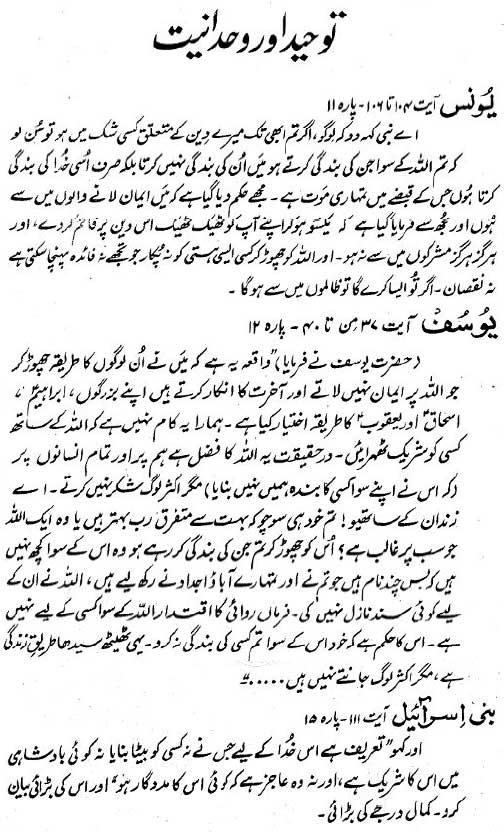
The Station Of al-Khawf
The Al-Khawf or fear station is one of the most splendid stations of the road and the most beneficial to the heart. It is also mandatory upon everyone. Allah said, “So fear them not, but fear Me if you are believers.” [3:175], “And fear none but Me.” [2:40], “So fear not men but fear Me.” [5:44]
Allah, subhanahu wa ta’ala, also praised His people in His book, saying, “Verily! Those who live in awe for fear of their Lord . . . It is these who race for the good deeds and they are foremost in them.” [23:57-61]
Aisha once asked the Prophet, sallallaahu alayhe wa sallam, “O Messenger of Allah, when Allah says And those who give that (their charity) which they give with their hearts full of fear . .” [23:60] is he the one who commits adultery, drinks alcohol, or steals?” He said, “No, daughter of As-Siddeeq. It is the man who fasts, prays, and pays sadaqah. But he fears that none will be accepted from him.” (Tirmithi and others)
Al-Hasan al-Basri said, “By Allah, they performed the acts of obedience and struggled in them and they were afraid that their deeds will be rejected.” The believer has combined good deeds and fear and the hypocrite has combined bad deeds and a sense of security.
Other terms have similar meanings to al-khawf but are not synonymous, such as wajal, khashyah and rahbah. Abu Al-Qasim Al-Junaid said, “Khawf is to expect punishment as long as you breathe.” It has been said that khawf is the restlessness of the heart because of the remembrance of the cause of fear. It has also been said that khawf is the strength in the knowledge of the rulings and decrees. This is the reason for khawf and not khawf itself. It was also said that khawf is the escape of the heart from the occurrence of adversity when the heart senses it.
Khashyah is more specific than khawf. Khashyah is a quality that is particular of the people knowledgeable of Allah. Allah, subhanahu wa ta’ala, says, “It is only those who have knowledge among His slaves that fear Allah.” [35:28]
As a result khashyah is associated with knowledge. The Prophet, sallallaahu alayhe wa sallam, is reported to have said, “Indeed I have the most piety for Allah and have the greatest khashyah for Him.” (Bukhari and Muslim) And he is the most knowledgeable of Allah.
Khawf can be likened to a movement or a reaction but khashyah is involvement, action, and tranquillity. A person who sees the enemy, floods, or similar causes of fear will have one of the following two reactions: movement; i.e., running away from the cause, which is the state of khawf; or staying calm and staying in a place where the cause cannot reach him, and this is khashyah. Rahbah is diligence in running away from adversity. The opposite of this is raghbah or longing which involves the travel of the heart toward its desires. There is symmetry between raghbah and rahbah both in their pronunciation and meanings.
Wajal is the shivering and breaking of the heart when remembering the One it fears, His authority, punishment, or seeing Him.
Haybah is khawf associated with glorification and reverence. Its peak is achieved when love and knowledge are strongly combined. Ijlaal is glorification associated with love.
Khawf is for the common believers, while khashyah is for the knowledgeable and the scholars. Haybah is for those who love and Ijlaal is for those who are close (to Allah). The presence of Khawf and khashyah is according to how much knowledge is there, as the Prophet, sallallaahu alayhe wa sallam, said, “Indeed I am the most knowledgeable of Allah amongst you and have the most khashyah for Him.” (Bukhari and Muslim) He also said, “If you would know what I know, you would laugh little and weep much. You would not have joy with your wives in bed and you would go out to high places and pray fervently to Allah, The Mighty.” (Ahmad, Tirmidhi, and others)
The person with khawf resorts to fleeing and holding. The person with khashyah resorts to holding to knowledge. Their similitude is like a person who has no knowledge of medicine and a skilled, highly trained, and educated physician. The former resorts to diet and escape for treatment of his ills while the doctor resorts to the knowledge of diseases and medicines.
Abu Hafs said, “Khawf is the whip of Allah. He corrects with it those straying from His door.” He also said, “Khawf is a light in the heart, with it one can see the good and evil. Everyone you fear you run away from except Allah. When you fear Him, you run away to Him.” The person with khawf is a person fleeing from His Lord to His Lord.
Abu Sulaiman said, “When khawf departs from any heart, it falls apart.” Ibrahim bin Sufyan said, “When khawf settles in the heart, it burns the places of vain desires within it and it kicks out the love for this world.” Thun-Nun said, “People are on the road (meaning the Straight Path) as long as they have khawf. When they lose it, they stray from the road.”
Khawf has not sought itself. It is simply a means sought to obtain something else. It disappears when the cause of khawf disappears. That is why the people of Paradise will have no khawf, nor will they grieve.
Khawf is related to deeds and actions, while love is related to Allah and His Attributes. The love of the believers to their Lord multiplies when they enter the House of Bliss and they will have no fear. For that, the station of love is greater and higher than the station of khawf.
The truthful khawf is what comes between the person and the prohibitions of Allah. If khawf exceeds that, then there may be a concern for getting into despair and hopelessness. Abu Uthman said, “The true khawf is being cautious of committing sins manifest or hidden.”
I heard Shaikhul-Islam Ibn Taymiyyah say, “The commendable khawf is what restrains you from the prohibitions of Allah.”
Al-Harawi said, “Khawf is to slip away from comfort and security by recognizing the warning of Allah.” The beginning of khawf is to fear the punishment. This is the kind of khawf that produces sound Imaan (faith). This can be attained by believing in the warnings of Allah and remembering the sin. Khawf is preceded by feeling and knowledge. It is impossible that a person may have khawf without having feelings of fear.
Khawf is associated with two things: first, the thing feared; and second, anything that may lead to it. Khawf can then be as great as the feeling of the person to the feared thing and what leads to it. When a person doesn’t think that something would lead to the object that should be feared, they would not fear that thing. The same is true if he does not know the measure of the fearful thing then, he would not have the correct fear.
Khawf (fear) and rajaa’ (hope) complement one another. The similitude of the heart in its travel to Allah is like a bird. Love is its head, and khawf and rajaa’ are the wings. When the head and both wings are sound, the bird is capable and skilled in flying. However, when the head is cut off, the bird will die. When the bird loses a wing, it then becomes a target for every hunter and predator. The scholars favored, however, the wing of khawf over the wing of rajaa’, especially when the person is young and healthy. They favored the wing of rajaa’ over the wing of khawf when the person is about to leave this world.
Abu Sulaiman said, “The heart ought to have more khawf. When rajaa’ dominates, it ruins it.” It was also said, “The best state is to have the same amount of khawf and rajaa’, but to have more love. Love is the boat, rajaa’ is the leader, khawf is the driver, and Allah is the One Who helps those reach the goal by His Grace and Generosity.”
Imaam ibn al-Qayyim al-Jawziyyah rahimahullaah
Narmi, Haya Aur Husn e Khulq
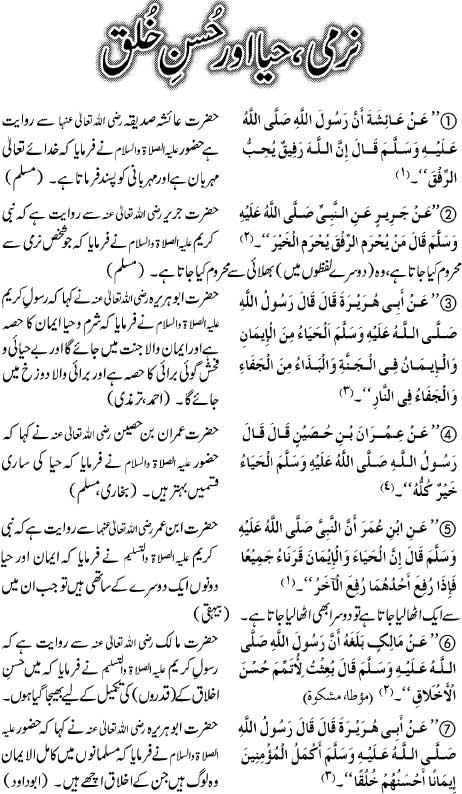
The Qur’an And The Science Of Stars
The Qur’an is that miraculous book of Allah that brought humanity from the days of ignorance to the age of rationalism. It is that unique and phenomenal book in the history of mankind that opened doors to every science. Allah said, “We shall show them Our signs in the Universe and in their own selves until it becomes manifest to them this the Qur’an is Truth.” (Qur’an, 41:53)
There have been many contentions and theories on scientific subjects by various people around the world, the Qur’an, however, has definite answers to all. It has been readily proven time and again; that many doctors and scientists have accepted that the Qur’an holds answers to all those questions which have been answered by them, recently, with the help of modern technology. As Allah said, “He has taught man which he knew not.” (Qur’an, 96:5)
Some accepted facts about the sun, the moon, and the stars are as follows:
Allah said, “And He has made the sun and the moon, both constantly pursuing their courses.” (Qur’an, 14:33)
When the sun is wound round and its light is lost. And when the stars fall. (Qur’an, 81:1-2)
Then when the stars lose their lights. (Qur’an, 77:8)
Qur’an has mentioned the two theories of science. First, about the movement of the stars, and the second about the end of solar energy. Under the Ptolemaic system, it was said that sunrises and pierces through the sky and the earth is stable. But, this notion was dropped in the 16th century and the theory of Prussian astronomer Copernicus was accepted, who said that the earth revolves around the sun.
It was only after Galileo, an Italian mathematician, that the true nature of the solar phenomenon was recognized. He invented a telescope and observed the rotation of the sun. Thus, what the Qur’an mentioned in the early 17th century was accepted by people in the seventeenth century. “And the sun runs on its fixed course for a term (appointed). That is the Decree of the All-Mighty, the All-Knowing.” (Qur’an, 36:38)
“And by the planets that move swiftly and hide themselves.” (Qur’an, 81: 16)
Scientists also say that the total life of the sun is 10 to the power 10 years, and it will eventually change into black dwarf stars. The Qur’an also confirms the fact that the sun’s light would disappear. They also admit that the death of the sun would be the end of this world — the Day of Judgment will come.
– by Ahmad Wahaj Siddiqui
Syed-ul-Mursaleen (S.A.W) Kay Mubarak Akhlaq
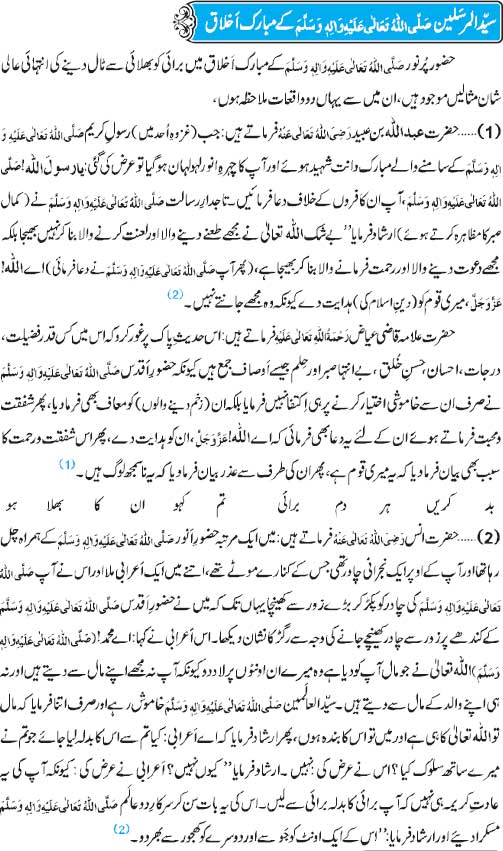
Muslim College Life: Dating, Drinking and Deen
Freedom. Young people live for the day when they can move out of the house and go to college and finally be free. Freedom from their parents, from restrictions on their lifestyle, from everyone telling them what to do.
This is why in college you find a whole generation that does what they want. Life’s short they say, let’s enjoy ourselves while we can.
So it goes for Muslims. In college, you find the most amazing things, Muslims who don’t pray, Muslims who date, go out to parties, and drink.
Why is this happening?
For one, when students go off to university they finally realize that what they believed in was blind. Religion becomes like a fairytale, when they got old enough, they knew better than to believe in it.
Most have little knowledge about Islam and have maybe memorized the right rituals to get by. Why believe something on faith, they ask. After all, we cannot see heaven or hell. How do we know Islam is right anyway?
Islamic culture to them means marrying someone they never knew. It means arranged marriages and never hanging out or having fun.
For girls Islamic culture has even less to offer. It would mean double standards or having to serve a husband the rest of her life.
The western alternative to this looks a lot more attractive.
In western culture “love and romance” are supposedly everywhere. Everyone is out looking for love freely. Meeting someone, going out, seeking pleasure sounds a lot better.
But what about the downside? For love at first sight, you need to have the right image, the right hair, the right clothes.
Girls have to aspire to be like the latest supermodels, they have to hold back age. Who’s going out with who, what are my friends thinking, what will happen if I don’t get the right girl or guy, what is my girlfriend or boyfriend thinking, all become important.
Frustration, desperation, and unhappiness become the norm.
Imagine all the heartache youth would save if they followed the Islamic alternative.
In true Islam, unlike culture, there is no gameplaying. If two people wish to be involved they are both straight with one another.
Unlike what goes on today amongst some Muslims, they both meet each other and make a contract to marry. Women are treated with respect, there is no sexual bombardment like there is in western society. Sex in western culture is also often seen as a vice or a sin of the flesh. But even in religious Islam, sex is seen as natural. As long as it is in the right circumstances when the two are committed to one another in marriage.
Drinking in college is also the norm, unfortunately. If you don’t drink or party you’re seen as weird. Drinking is cool and a way for people to socialize, meet and have fun. The one who doesn’t is less of a person and ‘misses out’. Drinking and all the harm that comes with it is cut off at the root in Islam. So many problems are avoided, accidents, pregnancy, violence, and even rape for example.
In college and in the world, success in life is not seen in terms of religion. It is seen as what other people think, one’s careers, how much money they make. If you are religious you must have failed at life. But why do we have this separation? and this blindness in religion?
The Quran tells us again and again not to have blind faith, not to follow the religion of our forefathers.
Yet, we as Muslims have stopped thinking. We may think about what our friends or other people will say, but we avoid thinking about the real issues.
We spend so much time on the opposite sex, thinking about careers, money, etc, but we forget to think about death and how much of this we will really be able to take with us?
“Every soul shall have a taste of death and only on the Day of Judgement shall you be paid your full recompense.. .for the life of this world is but goods and chattels of deception”
(Quran 3:185)
Shouldn’t we take the time to contemplate what will happen to us after we hit the grave? After all, what is the point of life if we are not accountable for our actions? If there is no creator, what is the point of being honest or good?
If we really look at our life we see that everything is indefinite, getting a job, even living until tomorrow. In fact, we could die anytime, this is definite, the _only_ dead certain thing in our life.
Most of us believe we can make up for our actions later or we can be religious later.
We are gambling.
The chances of our dying today are little, but the stakes are high. Allah reminds us of the importance of this,
“O you who believe, obey Allah as he should be obeyed, and die not except in a state of Islam”
(Quran3:102)
Each of us needs to decide.
On the Day of Judgement, it will be us alone who will be asked about our actions.
“Verily We have revealed the Book to thee in truth, for (instructing) mankind. He, then that receives guidance benefits his own soul: but he that strays injures his own soul…”
(Quran 39:41)
This is the true definition of freedom. To learn about Islam and the world openly. To contemplate life and death. And after learning the truth, obeying the word of God.
“Those on whom knowledge has been bestowed may learn that the (Quran) is the truth from your Lord and that they believe therein, and their hearts may be made humbly (open) to it…”
(Quran 22:54)
Once students have this rock-solid intellectual belief in Islam, the corruptness and falseness of the people around them are clear. The beauty and wisdom of the Islamic way, the best alternative is clear. What others do is of less importance. If others think they were weird to pray or weird, to be honest, they would still pray and still be honest because they know their deen.
Our Quran’s are left on the top shelves, gathering dust. Sometimes the most it is read is when someone dies. How is this to help, when the guidance comes too late. The Quran is for the living. The path to understanding and following Islam comes from learning first.
How many of us are Muslim, yet have never read the Quran in our native language?
How many of us are Muslim, yet have yet to open a book on hadith or sunnah?
How many of us defend Islam to non-Muslims, but do not follow it ourselves?
May Allah forgive and lead us and all those lost to the straight path.
In Sha Allah.
Ameen.
based on a talk by Abdul Wajid “Born to be Brown”, UK
by Huma Ahmad

